人教版选修5 Unit 5 First aid Using language课件 (51张PPT)
文档属性
| 名称 | 人教版选修5 Unit 5 First aid Using language课件 (51张PPT) | 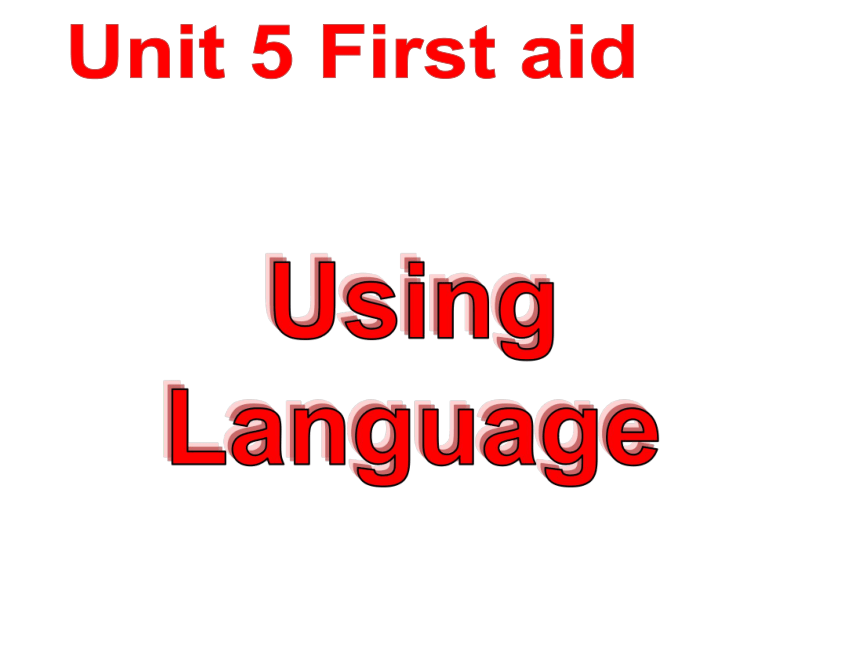 | |
| 格式 | zip | ||
| 文件大小 | 994.5KB | ||
| 资源类型 | 教案 | ||
| 版本资源 | 人教版(新课程标准) | ||
| 科目 | 英语 | ||
| 更新时间 | 2020-08-20 19:18:16 | ||
图片预览

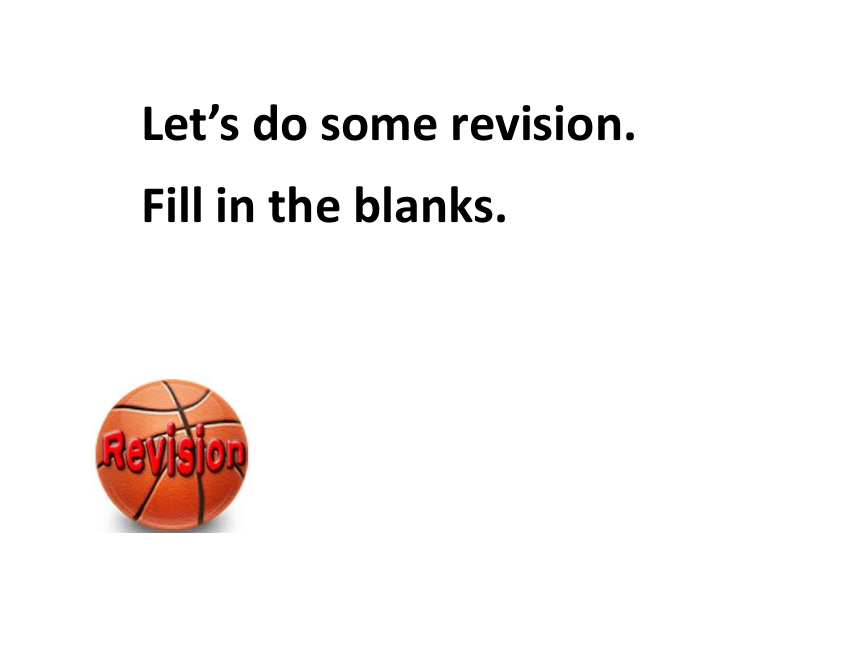
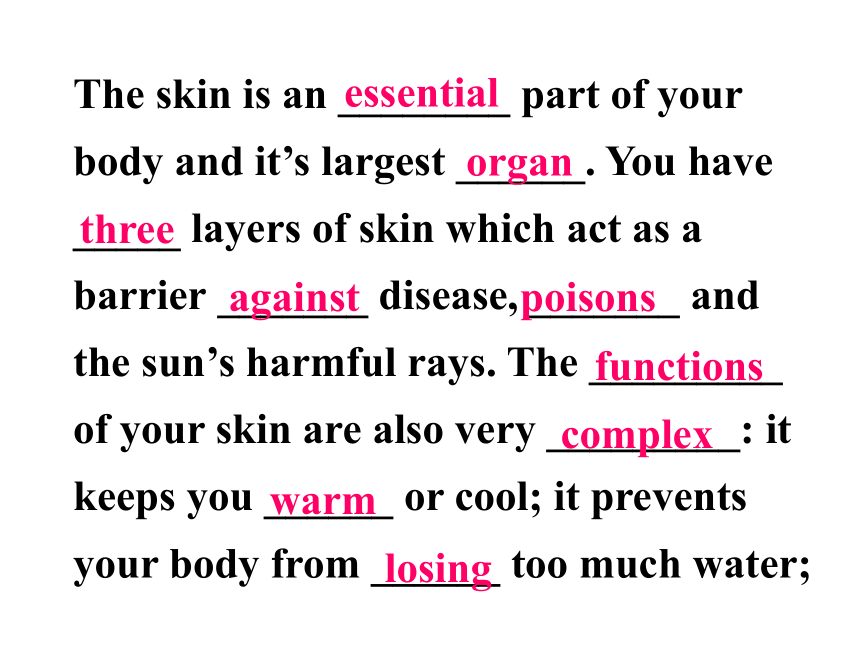
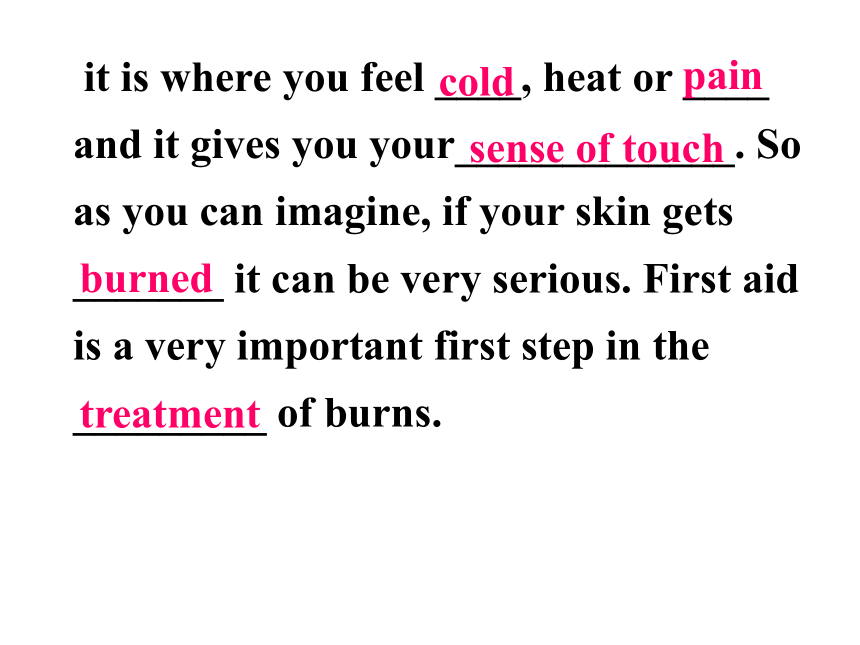
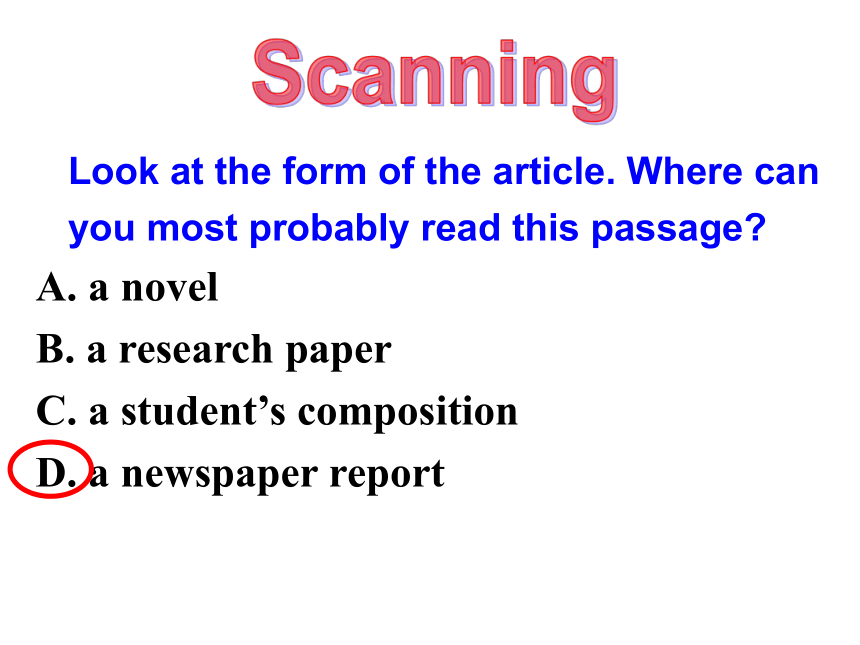
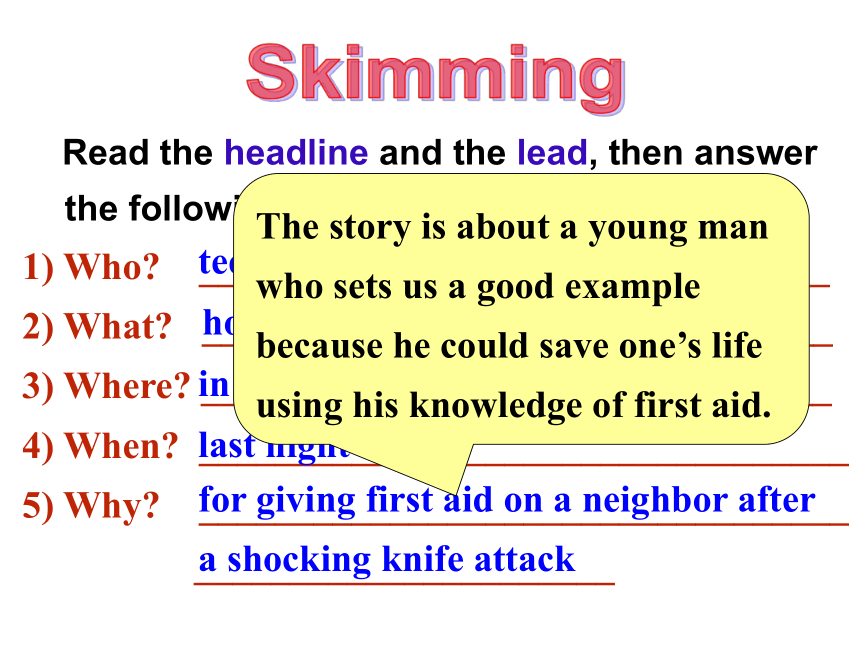
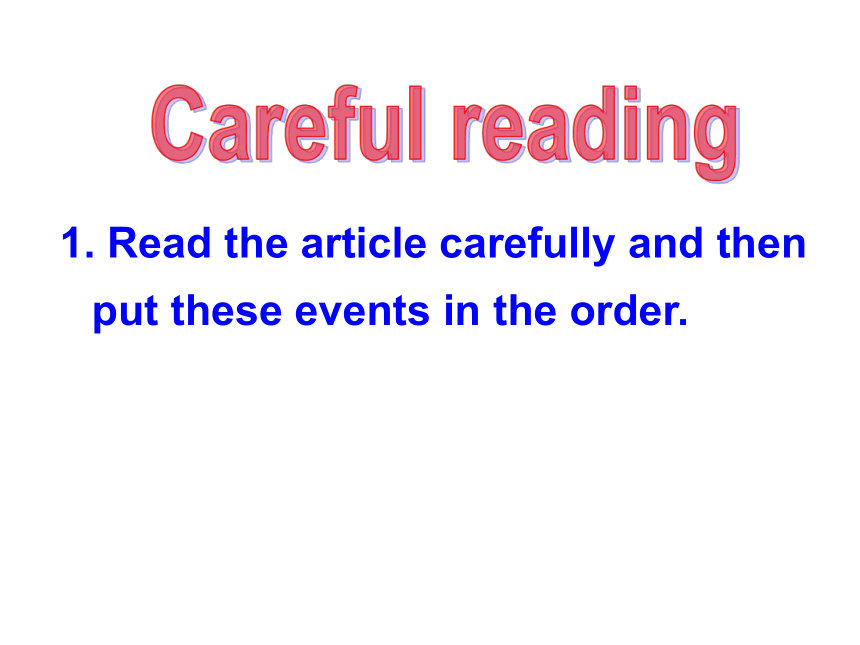
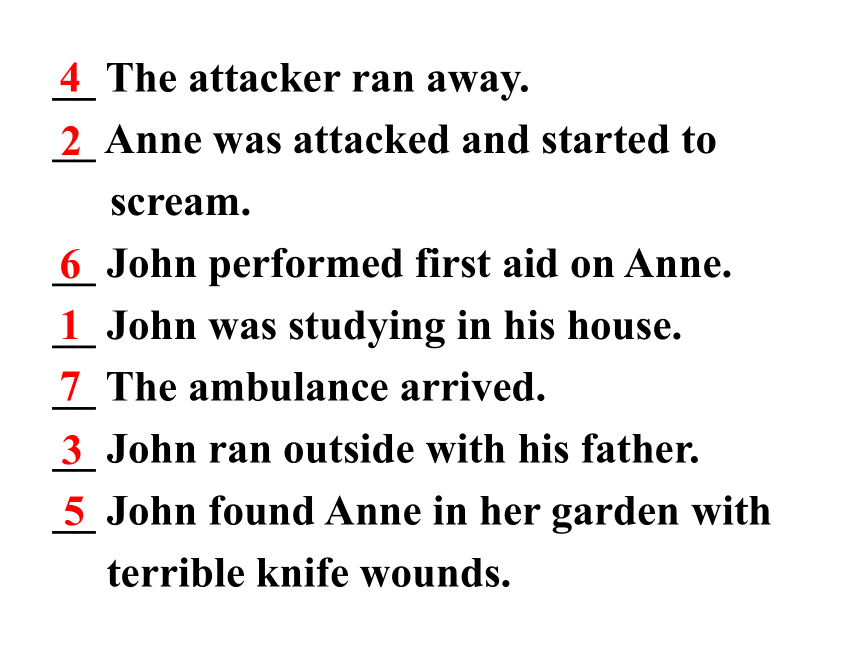
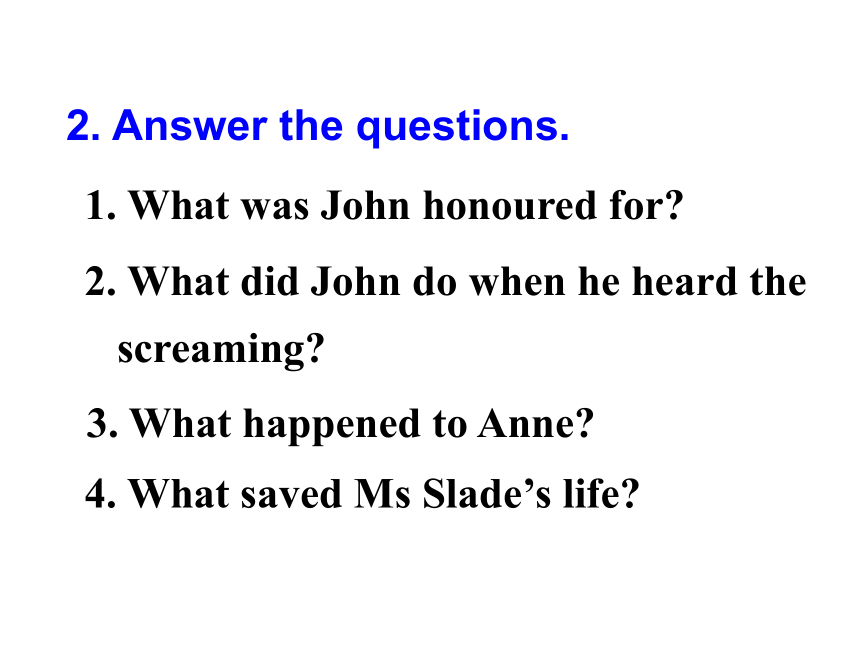
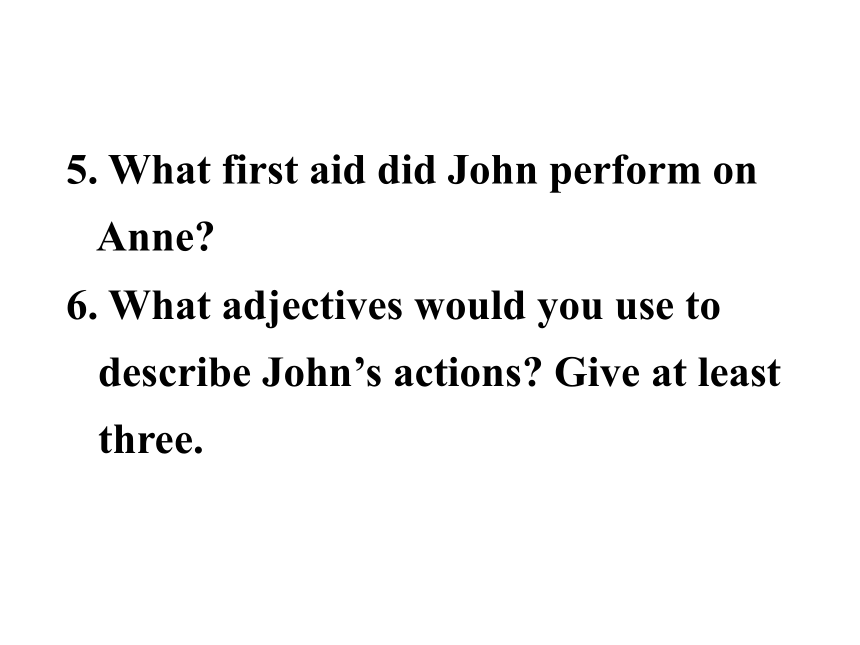
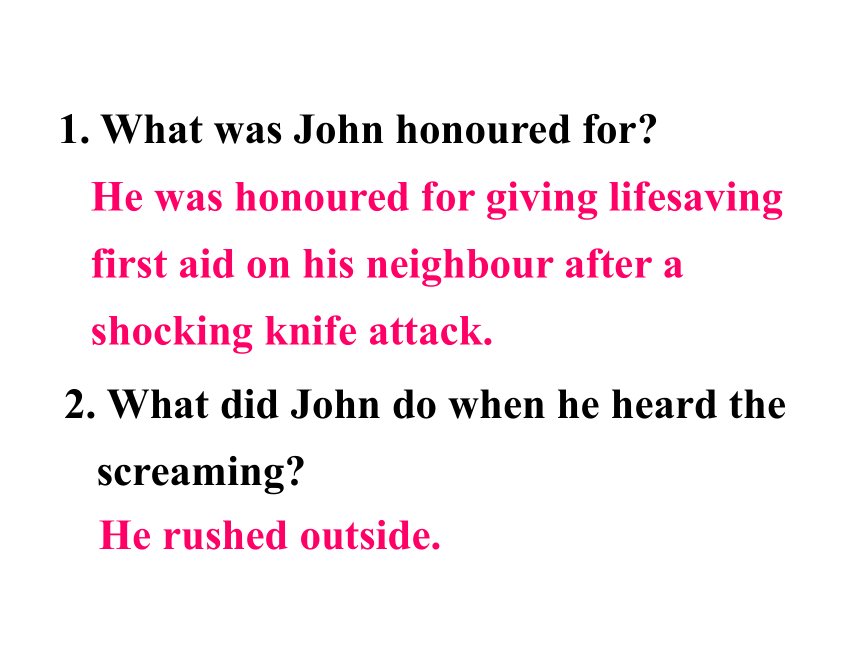
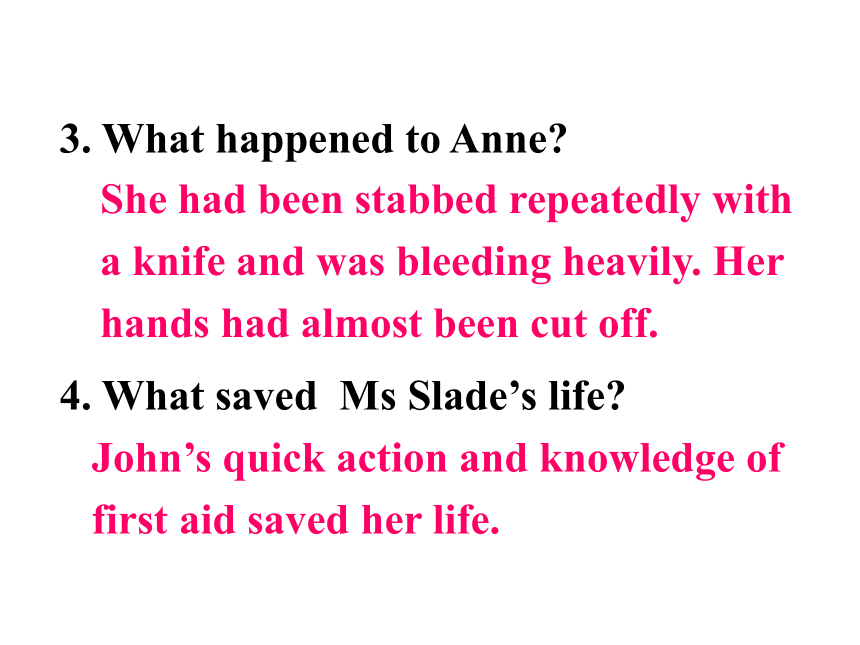
文档简介
(共51张PPT)
Let’s
do
some
revision.
Fill
in
the
blanks.
The
skin
is
an
________
part
of
your
body
and
it’s
largest
______.
You
have
_____
layers
of
skin
which
act
as
a
barrier
_______
disease,
_______
and
the
sun’s
harmful
rays.
The
_________
of
your
skin
are
also
very
_________:
it
keeps
you
______
or
cool;
it
prevents
your
body
from
______
too
much
water;
essential
organ
three
against
poisons
warm
losing
complex
functions
it
is
where
you
feel
____,
heat
or
____
and
it
gives
you
your_____________.
So
as
you
can
imagine,
if
your
skin
gets
_______
it
can
be
very
serious.
First
aid
is
a
very
important
first
step
in
the
_________
of
burns.
cold
pain
sense
of
touch
burned
treatment
Look
at
the
form
of
the
article.
Where
can
you
most
probably
read
this
passage?
a
novel
B.
a
research
paper
C.
a
student’s
composition
D.
a
newspaper
report
Read
the
headline
and
the
lead,
then
answer
the
following
questions.
1)
Who?
_________________________________
2)
What?
_________________________________
3)
Where?
_________________________________
4)
When?
__________________________________
5)
Why?
__________________________________
______________________
teenager
John
Janson
honored
at
the
Lifesaver
Awards
in
Rivertown
last
night
for
giving
first
aid
on
a
neighbor
after
a
shocking
knife
attack
The
story
is
about
a
young
man
who
sets
us
a
good
example
because
he
could
save
one’s
life
using
his
knowledge
of
first
aid.
Read
the
article
carefully
and
then
put
these
events
in
the
order.
__
The
attacker
ran
away.
__
Anne
was
attacked
and
started
to
scream.
__
John
performed
first
aid
on
Anne.
__
John
was
studying
in
his
house.
__
The
ambulance
arrived.
__
John
ran
outside
with
his
father.
__
John
found
Anne
in
her
garden
with
terrible
knife
wounds.
4
2
6
1
7
3
5
2.
Answer
the
questions.
1.
What
was
John
honoured
for?
2.
What
did
John
do
when
he
heard
the
screaming?
3.
What
happened
to
Anne?
4.
What
saved
Ms
Slade’s
life?
5.
What
first
aid
did
John
perform
on
Anne?
6.
What
adjectives
would
you
use
to
describe
John’s
actions?
Give
at
least
three.
1.
What
was
John
honoured
for?
2.
What
did
John
do
when
he
heard
the
screaming?
He
was
honoured
for
giving
lifesaving
first
aid
on
his
neighbour
after
a
shocking
knife
attack.
He
rushed
outside.
4.
What
saved
Ms
Slade’s
life?
John’s
quick
action
and
knowledge
of
first
aid
saved
her
life.
3.
What
happened
to
Anne?
She
had
been
stabbed
repeatedly
with
a
knife
and
was
bleeding
heavily.
Her
hands
had
almost
been
cut
off.
5.
What
first
aid
did
John
perform
on
Anne?
He
used
some
tea
towels
and
tape
to
treat
the
most
severe
injuries
to
Anne’s
hands.
He
slowed
the
bleeding
by
applying
pressure
to
the
wounds
until
the
police
and
ambulance
arrived.
6.
What
adjectives
would
you
use
to
describe
John’s
actions?
Give
at
least
three.
brave,
quick-thinking,
helpful,
heroic,
courageous,
unselfish,
fearless,
confident
Who
What
did
he
hear
Where
did
he
go
John
Janson
__________
___________
of
Ms
Slade
3.
Read
the
text
and
fill
in
the
blanks.
Screaming
Front
garden
What
did
he
do
Where
did
he
get
his
knowledge
What
did
he
receive
Using
some
________
and
tape
to
_____
the
injuries
and
________
pressure
to
the
wounds
to
_________________
Young
Lifesaver
Scheme
at
his
_____
_______
______________________________
The
Lifesaver
Awards
tea
towels
dress
applying
slow
the
bleeding
high
school
1.
Do
you
think
John
was
silly
or
brave
to
get
involved
in
the
situation?
Give
reasons.
2.
Would
you
have
done
the
same
as
John?
Give
reasons.
3.
Do
you
think
it
is
worthwhile
to
take
a
course
in
first
aid?
Give
reasons.
Fill
in
the
Blanks.
Last
night,
John
heard
___________
and
_______
outside.
His
neighbor
Anne
had
been
_______.
She
was
_________
heavily.
John
and
his
father
asked
for
_________,
but
nobody
could
____
____
______
___
them.
They
got
some
tea
______
and
screaming
bleeding
stabbed
rushed
towels
put
their
hands
on
bandages
_____
from
their
house.
John
used
these
to
______
the
most
severe
injuries
and
_______
the
bleeding
by
________
_________
to
the
wounds.
It
was
John’s
______
_______
and
____________
of
first
aid
that
saved
Anne’s
life.
knowledge
action
quick
applying
pressure
dress
slowed
tape
Why
is
first
aid
important
in
our
daily
life?
Because
seconds
count
in
an
emergency,
and
knowing
what
to
do
can
mean
the
difference
between
life
and
death.
What’s
the
most
important
thing
to
remember
when
dealing
with
an
emergency?
To
stay
calm
and
not
to
be
panic.
What
do
the
letters
“DR
ABC”
stand
for?
“D”
stands
for
“Danger”;
“R”
stands
for
“Response”;
“A”
stands
for
“Airway”;
“B”
stands
for
“Breathing”;
“C”
stands
for
“Circulation”.
To
give
first
aid
correctly,
you
can
use
the
letters
“DR
ABC”
to
help
you
remember
the
things
you
need
to
do.
How
do
we
do
the
first
aid
correctly?
First
we
should
make
sure
that
the
accident
scene
is
no
longer
dangerous.
Then
we
can
ask
the
person
simple
questions
to
see
if
he/she
is
conscious
and
can
breathe.
We
must
make
sure
the
person’s
airway
is
open
and
it’s
easy
to
breathe
by
gently
tipping
the
person’s
head
back
slightly.
If
the
person
is
not
breathing,
we
must
try
to
start
his/her
breathing
at
once
within
five
minutes,
or
he/she
may
die.
At
last,
we
can
look
for
colour,
coughing
and
eye
movement
to
see
if
the
person’s
blood
is
circulating.
We
can
also
put
a
finger
on
the
person’s
wrist
or
neck
to
check
his/her
pulse.
If
the
person
is
bleeding,
we
should
cover
the
wound
with
a
clean
piece
of
cloth
and
press
on
the
wound
to
stop
the
bleeding.
1
在救生员颁奖大会
2
在颁奖大会
3
对某人实施急救
4
紧急抢救
5
骇人听闻的持刀杀人
at
the
Lifesaver
Awards
at
a
ceremony
give
first
aid
on
sb.
lifesaving
first
aid
a
shocking
knife
attack
6
找到
7
手上的伤口
8
按住伤口
9
敏捷的思维
10
产生差别
put
one’s
hands
on
=
find
the
injury
to
the
hand/
arm/
leg
…
apply
pressure
to
the
wound
quick
thinking
make
a
difference
1.
John
was
presented
with
his
award
at
a
ceremony
which
recognized
the
bravery
of
ten
people
who
had
saved
the
life
of
another.
which
引导一个定语从句。
who引导一个定语从句。
present
v.
颁发,授予,赠送
e.g.
The
mayor
presented
the
prizes
in
person.
【常用】
present
sb.
with
sth.
=
present
sth.
to
sb.
授予/赠给某人某物
e.g.
He
presented
a
silver
cup
to
the
winner.
他把银杯颁给了获胜者。
此外,present
作动词还有“呈现,显示;
阐述,表达;引见”等意思。
e.g.
The
same
problem
presented
itself
to
her
again.
同样的问题又在她身上出现。
ceremony
n.
(C)典礼;仪式
(U)礼节;礼仪;客套
Expressions:
stand
on
ceremony
拘泥礼节;讲究客套
with
ceremony
正式;隆重
without
ceremony
不拘礼节地;随便地
e.g.
The
wedding
ceremony
was
beautiful.
There
is
no
need
for
ceremony
between
us.
e.g.
The
head
of
state
was
welcomed
with
full
ceremony.
人们以最高规格的仪式欢迎国家首脑。
What
the
old
headmaster
said
at
the
graduation
ceremony
dwells
in
my
mind.
老校长在毕业典礼上讲的话一直留在我的脑海里。
此句型中when作并列连词相当于and
then意为“正当……时突然”,常用于以下句型:
be
doing
…
when…
正在做……突然
be
about
to
do
…
when…
即将做……突然
be
on
the
point
to
do
…
when…
正要去做……突然
2.
John
was
studying
in
his
room
when
he
heard
screaming.
I
had
just
stepped
out
of
the
bathroom
and
was
busy
drying
myself
with
a
towel,
_____
I
heard
the
steps.
while
B.
when
C.
since
D.
after
has
/
have
/
had
done
…
when
…
刚刚
……
这时
(突然)
4.
It
was
John’s
quick
action
and
knowledge
of
first
aid
that
saved
Ms
Slade’s
life.
It
is
/
was
…
that
…
强调句
e.g.
It
was
his
words
that
hurt
her.
It
was
her
that
his
words
hurt.
It
was
yesterday
that
I
met
him.
5.
He
immediately
asked
a
number
of
nearby
people
for
bandages,
but
…
他立即向旁边的一些人要绷带,但
……
a
number
of
+
可数名词,谓语用复数,意为“许多、大量的……”,
the
number
of
+
可数名词,谓语用单数,意为
“……的数目”。例如:
①
A
number
of
problems
have
arisen.
已经出现了许多问题。
②
The
number
of
colleges
has
increased
in
the
past
10
years.
在过去的十年里,大学的数量有所增加。
6.
John
used
these
to
treat
the
most
severe
injuries
to
Ms
Slade’s
hand.
1)
treat
处理
;治疗
e.g.
He
was
treated
for
severe
sunburn.
2)
treat
对待,把……看作,请客
e.g.
The
stepmother
treated
Cinderella
(灰
姑娘)
very
badly.
Please
treat
everything
I
said
as
a
joke.
I’ll
treat
you
all
to
dinner.
apply
申请,请求;使用,应用
e.g.
We
should
apply
both
theories
in
the
language
classroom.
我们应把两种理论都运用到语言教室中去。
apply
to
+
部门,
组织
,
人
向……提出申请
apply
to
do
sth.
申请做某事
apply
oneself
/
sth.
to
sth.
使致力(于),
使专心从事
e.g.
He
applied
himself
to
learning
French.
他致力于学习法语。
We
must
apply
our
minds
to
finding
a
solution.
我们要动动脑筋找出解决的办法来。
apply
for
sth.
申请
apply
for
a
job
/post
/
passport
/
visa
申请工作
/
职位
/
护照
/
签证
apply
to
sth.
适用
e.g.
This
rule
can
not
apply
to
every
case.
这条规则并不是在每种情况下都能适
用的。
e.g.
He
has
applied
for
a
post
in
England.
他已申请在英国供职。
8.
put
one’s
hands
on
找到
e.g.
I
know
their
address
is
here
somewhere,
but
I
can’t
put
my
hands
on
it
(找到它)
right
now.
Whatever
he
puts
his
hands
on
(他无论
着手做什么),
he
does
it
extraordinarily
well.
9.
It
shows
that
a
knowledge
of
first
aid
can
make
a
real
difference.
make
a
(some,
no,
etc)
difference
有(一些,没有什么)区别
e.g.
It
makes
no
difference
to
you
whether
I
like
it
or
not,
because
you
never
listen
to
me.
It
doesn’t
make
any
difference
to
me
where
you
come
from.
I.
根据下列各句句意及所给单词的首字母或汉语提示,写出该单词的正确形式。
Medical
experts
will
train
doctors
to
t______
the
disease.
2.
Don’t
put
so
much
p________
on
the
table;
it’s
going
to
shake
and
break
under
your
weight.
treat
pressure
3.
The
policeman
showed
great
b_______
in
the
face
of
danger.
4.
We
called
the
police
and
___________
(救护车)
but
it
was
a
long
time
before
they
arrived.
5.
The
two
families
are
busy
today
preparing
for
the
wedding
___________
(仪式)
tomorrow.
ceremony
bravery
ambulance
II.
用适当的介词填空。
We
attended
a
dinner
party
hosted
_____
the
president
of
the
company.
2.
Mark
performed
an
operation
________
Daisy’s
ankle
yesterday.
3.
Thank
you
____
giving
me
the
address.
I’ll
write
off
at
once.
4.
Ruth
is
looking
forward
to
taking
a
tour
___________
England.
by
on
/
for
for
of
/
around
5.
They
found
that
everything
was
taken
away
______
their
house.
6.
We
are
proud
____
what
you
have
achieved
in
your
study.
7.
What
problems
should
I
watch
out
____
when
buying
an
old
house?
8.
I
don’t
want
to
get
involved
___
some
lengthy
argument
about
who
is
to
blame.
from
of
for
in
III.
用方框内所给短语的适当形式填空。
I
know
their
address
is
here
somewhere,
but
I
can’t
______________
it
right
now.
put
my
hands
on
make
a
difference
put
one’s
hands
on
take
part
in
a
number
of
apply
for
2.
To
repair
this
cupboard,
you
will
need
_____________
specific
tools.
3.
Everyone
has
his
special
skills
and
interests,
and
only
by
discovering
them
can
he
truly
_________________.
4.
Only
this
year’s
graduates
are
allowed
to
__________
the
most
popular
subjects
for
a
Master’s
degree.
5.
People
who
____________
this
sport
are
likely
to
get
injured.
take
part
in
apply
for
make
a
difference
a
number
of
IV.
根据所给提示将下列句子翻译成英语。
1.
Robert因为没有付电费,所以被断电。
(cut
off)
_________________________________
_________________________________
2.
我正要去看你,这时碰到了George。
(when)
__________________________________
________________
I
was
just
coming
to
see
you
when
I
ran
into
George.
The
power
was
cut
off
because
Robert
didn’t
pay
the
bill.
3.
毫无疑问,吸烟会严重损害我们的健
康。(There
is
no
doubt
that
...)
________________________________
________________________________
There
is
no
doubt
that
smoking
can
seriously
damage
our
health.
Let’s
do
some
revision.
Fill
in
the
blanks.
The
skin
is
an
________
part
of
your
body
and
it’s
largest
______.
You
have
_____
layers
of
skin
which
act
as
a
barrier
_______
disease,
_______
and
the
sun’s
harmful
rays.
The
_________
of
your
skin
are
also
very
_________:
it
keeps
you
______
or
cool;
it
prevents
your
body
from
______
too
much
water;
essential
organ
three
against
poisons
warm
losing
complex
functions
it
is
where
you
feel
____,
heat
or
____
and
it
gives
you
your_____________.
So
as
you
can
imagine,
if
your
skin
gets
_______
it
can
be
very
serious.
First
aid
is
a
very
important
first
step
in
the
_________
of
burns.
cold
pain
sense
of
touch
burned
treatment
Look
at
the
form
of
the
article.
Where
can
you
most
probably
read
this
passage?
a
novel
B.
a
research
paper
C.
a
student’s
composition
D.
a
newspaper
report
Read
the
headline
and
the
lead,
then
answer
the
following
questions.
1)
Who?
_________________________________
2)
What?
_________________________________
3)
Where?
_________________________________
4)
When?
__________________________________
5)
Why?
__________________________________
______________________
teenager
John
Janson
honored
at
the
Lifesaver
Awards
in
Rivertown
last
night
for
giving
first
aid
on
a
neighbor
after
a
shocking
knife
attack
The
story
is
about
a
young
man
who
sets
us
a
good
example
because
he
could
save
one’s
life
using
his
knowledge
of
first
aid.
Read
the
article
carefully
and
then
put
these
events
in
the
order.
__
The
attacker
ran
away.
__
Anne
was
attacked
and
started
to
scream.
__
John
performed
first
aid
on
Anne.
__
John
was
studying
in
his
house.
__
The
ambulance
arrived.
__
John
ran
outside
with
his
father.
__
John
found
Anne
in
her
garden
with
terrible
knife
wounds.
4
2
6
1
7
3
5
2.
Answer
the
questions.
1.
What
was
John
honoured
for?
2.
What
did
John
do
when
he
heard
the
screaming?
3.
What
happened
to
Anne?
4.
What
saved
Ms
Slade’s
life?
5.
What
first
aid
did
John
perform
on
Anne?
6.
What
adjectives
would
you
use
to
describe
John’s
actions?
Give
at
least
three.
1.
What
was
John
honoured
for?
2.
What
did
John
do
when
he
heard
the
screaming?
He
was
honoured
for
giving
lifesaving
first
aid
on
his
neighbour
after
a
shocking
knife
attack.
He
rushed
outside.
4.
What
saved
Ms
Slade’s
life?
John’s
quick
action
and
knowledge
of
first
aid
saved
her
life.
3.
What
happened
to
Anne?
She
had
been
stabbed
repeatedly
with
a
knife
and
was
bleeding
heavily.
Her
hands
had
almost
been
cut
off.
5.
What
first
aid
did
John
perform
on
Anne?
He
used
some
tea
towels
and
tape
to
treat
the
most
severe
injuries
to
Anne’s
hands.
He
slowed
the
bleeding
by
applying
pressure
to
the
wounds
until
the
police
and
ambulance
arrived.
6.
What
adjectives
would
you
use
to
describe
John’s
actions?
Give
at
least
three.
brave,
quick-thinking,
helpful,
heroic,
courageous,
unselfish,
fearless,
confident
Who
What
did
he
hear
Where
did
he
go
John
Janson
__________
___________
of
Ms
Slade
3.
Read
the
text
and
fill
in
the
blanks.
Screaming
Front
garden
What
did
he
do
Where
did
he
get
his
knowledge
What
did
he
receive
Using
some
________
and
tape
to
_____
the
injuries
and
________
pressure
to
the
wounds
to
_________________
Young
Lifesaver
Scheme
at
his
_____
_______
______________________________
The
Lifesaver
Awards
tea
towels
dress
applying
slow
the
bleeding
high
school
1.
Do
you
think
John
was
silly
or
brave
to
get
involved
in
the
situation?
Give
reasons.
2.
Would
you
have
done
the
same
as
John?
Give
reasons.
3.
Do
you
think
it
is
worthwhile
to
take
a
course
in
first
aid?
Give
reasons.
Fill
in
the
Blanks.
Last
night,
John
heard
___________
and
_______
outside.
His
neighbor
Anne
had
been
_______.
She
was
_________
heavily.
John
and
his
father
asked
for
_________,
but
nobody
could
____
____
______
___
them.
They
got
some
tea
______
and
screaming
bleeding
stabbed
rushed
towels
put
their
hands
on
bandages
_____
from
their
house.
John
used
these
to
______
the
most
severe
injuries
and
_______
the
bleeding
by
________
_________
to
the
wounds.
It
was
John’s
______
_______
and
____________
of
first
aid
that
saved
Anne’s
life.
knowledge
action
quick
applying
pressure
dress
slowed
tape
Why
is
first
aid
important
in
our
daily
life?
Because
seconds
count
in
an
emergency,
and
knowing
what
to
do
can
mean
the
difference
between
life
and
death.
What’s
the
most
important
thing
to
remember
when
dealing
with
an
emergency?
To
stay
calm
and
not
to
be
panic.
What
do
the
letters
“DR
ABC”
stand
for?
“D”
stands
for
“Danger”;
“R”
stands
for
“Response”;
“A”
stands
for
“Airway”;
“B”
stands
for
“Breathing”;
“C”
stands
for
“Circulation”.
To
give
first
aid
correctly,
you
can
use
the
letters
“DR
ABC”
to
help
you
remember
the
things
you
need
to
do.
How
do
we
do
the
first
aid
correctly?
First
we
should
make
sure
that
the
accident
scene
is
no
longer
dangerous.
Then
we
can
ask
the
person
simple
questions
to
see
if
he/she
is
conscious
and
can
breathe.
We
must
make
sure
the
person’s
airway
is
open
and
it’s
easy
to
breathe
by
gently
tipping
the
person’s
head
back
slightly.
If
the
person
is
not
breathing,
we
must
try
to
start
his/her
breathing
at
once
within
five
minutes,
or
he/she
may
die.
At
last,
we
can
look
for
colour,
coughing
and
eye
movement
to
see
if
the
person’s
blood
is
circulating.
We
can
also
put
a
finger
on
the
person’s
wrist
or
neck
to
check
his/her
pulse.
If
the
person
is
bleeding,
we
should
cover
the
wound
with
a
clean
piece
of
cloth
and
press
on
the
wound
to
stop
the
bleeding.
1
在救生员颁奖大会
2
在颁奖大会
3
对某人实施急救
4
紧急抢救
5
骇人听闻的持刀杀人
at
the
Lifesaver
Awards
at
a
ceremony
give
first
aid
on
sb.
lifesaving
first
aid
a
shocking
knife
attack
6
找到
7
手上的伤口
8
按住伤口
9
敏捷的思维
10
产生差别
put
one’s
hands
on
=
find
the
injury
to
the
hand/
arm/
leg
…
apply
pressure
to
the
wound
quick
thinking
make
a
difference
1.
John
was
presented
with
his
award
at
a
ceremony
which
recognized
the
bravery
of
ten
people
who
had
saved
the
life
of
another.
which
引导一个定语从句。
who引导一个定语从句。
present
v.
颁发,授予,赠送
e.g.
The
mayor
presented
the
prizes
in
person.
【常用】
present
sb.
with
sth.
=
present
sth.
to
sb.
授予/赠给某人某物
e.g.
He
presented
a
silver
cup
to
the
winner.
他把银杯颁给了获胜者。
此外,present
作动词还有“呈现,显示;
阐述,表达;引见”等意思。
e.g.
The
same
problem
presented
itself
to
her
again.
同样的问题又在她身上出现。
ceremony
n.
(C)典礼;仪式
(U)礼节;礼仪;客套
Expressions:
stand
on
ceremony
拘泥礼节;讲究客套
with
ceremony
正式;隆重
without
ceremony
不拘礼节地;随便地
e.g.
The
wedding
ceremony
was
beautiful.
There
is
no
need
for
ceremony
between
us.
e.g.
The
head
of
state
was
welcomed
with
full
ceremony.
人们以最高规格的仪式欢迎国家首脑。
What
the
old
headmaster
said
at
the
graduation
ceremony
dwells
in
my
mind.
老校长在毕业典礼上讲的话一直留在我的脑海里。
此句型中when作并列连词相当于and
then意为“正当……时突然”,常用于以下句型:
be
doing
…
when…
正在做……突然
be
about
to
do
…
when…
即将做……突然
be
on
the
point
to
do
…
when…
正要去做……突然
2.
John
was
studying
in
his
room
when
he
heard
screaming.
I
had
just
stepped
out
of
the
bathroom
and
was
busy
drying
myself
with
a
towel,
_____
I
heard
the
steps.
while
B.
when
C.
since
D.
after
has
/
have
/
had
done
…
when
…
刚刚
……
这时
(突然)
4.
It
was
John’s
quick
action
and
knowledge
of
first
aid
that
saved
Ms
Slade’s
life.
It
is
/
was
…
that
…
强调句
e.g.
It
was
his
words
that
hurt
her.
It
was
her
that
his
words
hurt.
It
was
yesterday
that
I
met
him.
5.
He
immediately
asked
a
number
of
nearby
people
for
bandages,
but
…
他立即向旁边的一些人要绷带,但
……
a
number
of
+
可数名词,谓语用复数,意为“许多、大量的……”,
the
number
of
+
可数名词,谓语用单数,意为
“……的数目”。例如:
①
A
number
of
problems
have
arisen.
已经出现了许多问题。
②
The
number
of
colleges
has
increased
in
the
past
10
years.
在过去的十年里,大学的数量有所增加。
6.
John
used
these
to
treat
the
most
severe
injuries
to
Ms
Slade’s
hand.
1)
treat
处理
;治疗
e.g.
He
was
treated
for
severe
sunburn.
2)
treat
对待,把……看作,请客
e.g.
The
stepmother
treated
Cinderella
(灰
姑娘)
very
badly.
Please
treat
everything
I
said
as
a
joke.
I’ll
treat
you
all
to
dinner.
apply
申请,请求;使用,应用
e.g.
We
should
apply
both
theories
in
the
language
classroom.
我们应把两种理论都运用到语言教室中去。
apply
to
+
部门,
组织
,
人
向……提出申请
apply
to
do
sth.
申请做某事
apply
oneself
/
sth.
to
sth.
使致力(于),
使专心从事
e.g.
He
applied
himself
to
learning
French.
他致力于学习法语。
We
must
apply
our
minds
to
finding
a
solution.
我们要动动脑筋找出解决的办法来。
apply
for
sth.
申请
apply
for
a
job
/post
/
passport
/
visa
申请工作
/
职位
/
护照
/
签证
apply
to
sth.
适用
e.g.
This
rule
can
not
apply
to
every
case.
这条规则并不是在每种情况下都能适
用的。
e.g.
He
has
applied
for
a
post
in
England.
他已申请在英国供职。
8.
put
one’s
hands
on
找到
e.g.
I
know
their
address
is
here
somewhere,
but
I
can’t
put
my
hands
on
it
(找到它)
right
now.
Whatever
he
puts
his
hands
on
(他无论
着手做什么),
he
does
it
extraordinarily
well.
9.
It
shows
that
a
knowledge
of
first
aid
can
make
a
real
difference.
make
a
(some,
no,
etc)
difference
有(一些,没有什么)区别
e.g.
It
makes
no
difference
to
you
whether
I
like
it
or
not,
because
you
never
listen
to
me.
It
doesn’t
make
any
difference
to
me
where
you
come
from.
I.
根据下列各句句意及所给单词的首字母或汉语提示,写出该单词的正确形式。
Medical
experts
will
train
doctors
to
t______
the
disease.
2.
Don’t
put
so
much
p________
on
the
table;
it’s
going
to
shake
and
break
under
your
weight.
treat
pressure
3.
The
policeman
showed
great
b_______
in
the
face
of
danger.
4.
We
called
the
police
and
___________
(救护车)
but
it
was
a
long
time
before
they
arrived.
5.
The
two
families
are
busy
today
preparing
for
the
wedding
___________
(仪式)
tomorrow.
ceremony
bravery
ambulance
II.
用适当的介词填空。
We
attended
a
dinner
party
hosted
_____
the
president
of
the
company.
2.
Mark
performed
an
operation
________
Daisy’s
ankle
yesterday.
3.
Thank
you
____
giving
me
the
address.
I’ll
write
off
at
once.
4.
Ruth
is
looking
forward
to
taking
a
tour
___________
England.
by
on
/
for
for
of
/
around
5.
They
found
that
everything
was
taken
away
______
their
house.
6.
We
are
proud
____
what
you
have
achieved
in
your
study.
7.
What
problems
should
I
watch
out
____
when
buying
an
old
house?
8.
I
don’t
want
to
get
involved
___
some
lengthy
argument
about
who
is
to
blame.
from
of
for
in
III.
用方框内所给短语的适当形式填空。
I
know
their
address
is
here
somewhere,
but
I
can’t
______________
it
right
now.
put
my
hands
on
make
a
difference
put
one’s
hands
on
take
part
in
a
number
of
apply
for
2.
To
repair
this
cupboard,
you
will
need
_____________
specific
tools.
3.
Everyone
has
his
special
skills
and
interests,
and
only
by
discovering
them
can
he
truly
_________________.
4.
Only
this
year’s
graduates
are
allowed
to
__________
the
most
popular
subjects
for
a
Master’s
degree.
5.
People
who
____________
this
sport
are
likely
to
get
injured.
take
part
in
apply
for
make
a
difference
a
number
of
IV.
根据所给提示将下列句子翻译成英语。
1.
Robert因为没有付电费,所以被断电。
(cut
off)
_________________________________
_________________________________
2.
我正要去看你,这时碰到了George。
(when)
__________________________________
________________
I
was
just
coming
to
see
you
when
I
ran
into
George.
The
power
was
cut
off
because
Robert
didn’t
pay
the
bill.
3.
毫无疑问,吸烟会严重损害我们的健
康。(There
is
no
doubt
that
...)
________________________________
________________________________
There
is
no
doubt
that
smoking
can
seriously
damage
our
health.
